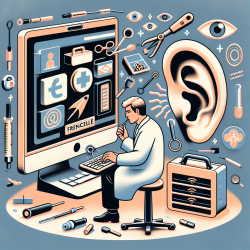Introduction
The COVID-19 pandemic has profoundly reshaped the landscape of mental health care, thrusting telemental health (TMH) into the spotlight as a vital modality for service delivery. As practitioners, understanding the nuances of TMH can help us adapt and thrive in this new environment. Recent research, such as the study by Doran and Lawson (2021), offers valuable insights into provider perceptions and experiences with TMH, providing a roadmap for enhancing our practice and improving outcomes for our clients.
Understanding Provider Perceptions
The study titled "The Impact of COVID-19 on Provider Perceptions of Telemental Health" conducted a comprehensive survey of 1,448 mental health providers to assess their attitudes towards TMH before and during the pandemic. The findings revealed a significant shift in perceptions, with an increased recognition of TMH's necessity and effectiveness during the pandemic. This shift underscores the importance of embracing TMH as a core component of mental health care delivery.
Key Insights for Practitioners
Here are some critical insights from the research that can guide practitioners in enhancing their TMH practice:
- Video vs. Telephone: Providers who primarily used video platforms reported higher satisfaction and perceived effectiveness compared to those using telephone-only modalities. This suggests that investing in robust video conferencing tools can enhance the quality of care.
- Training and Preparedness: The study highlighted the need for formal training in TMH to ensure providers feel equipped to deliver care effectively. Consider seeking out training opportunities to bolster your skills in this area.
- Positive Attitudes Correlate with Experience: Providers with prior experience in TMH reported more positive attitudes towards its use. Engaging with TMH regularly can build confidence and improve perceptions of its effectiveness.
Strategies for Successful Implementation
To successfully integrate TMH into your practice, consider the following strategies:
- Invest in Technology: Ensure you have access to reliable, high-quality video conferencing tools to facilitate seamless sessions with clients.
- Seek Continuous Education: Stay informed about the latest developments in TMH and participate in ongoing training to refine your skills.
- Foster Client Engagement: Communicate openly with clients about the benefits of TMH and address any concerns they may have to build trust and engagement.
Encouraging Further Research
While the study provides valuable insights, it also highlights areas for further exploration. Practitioners are encouraged to engage in ongoing research and dialogue about TMH to continue improving its implementation and effectiveness. By staying informed and contributing to the body of knowledge, we can collectively enhance the quality of mental health care delivery.
Conclusion
The COVID-19 pandemic has accelerated the adoption of telemental health, presenting both challenges and opportunities for mental health practitioners. By leveraging the insights from recent research and embracing TMH as a core component of our practice, we can improve access to care and outcomes for our clients. As we navigate this evolving landscape, let us commit to continuous learning and innovation in our approach to mental health care.
To read the original research paper, please follow this link: The Impact of COVID-19 on Provider Perceptions of Telemental Health.










